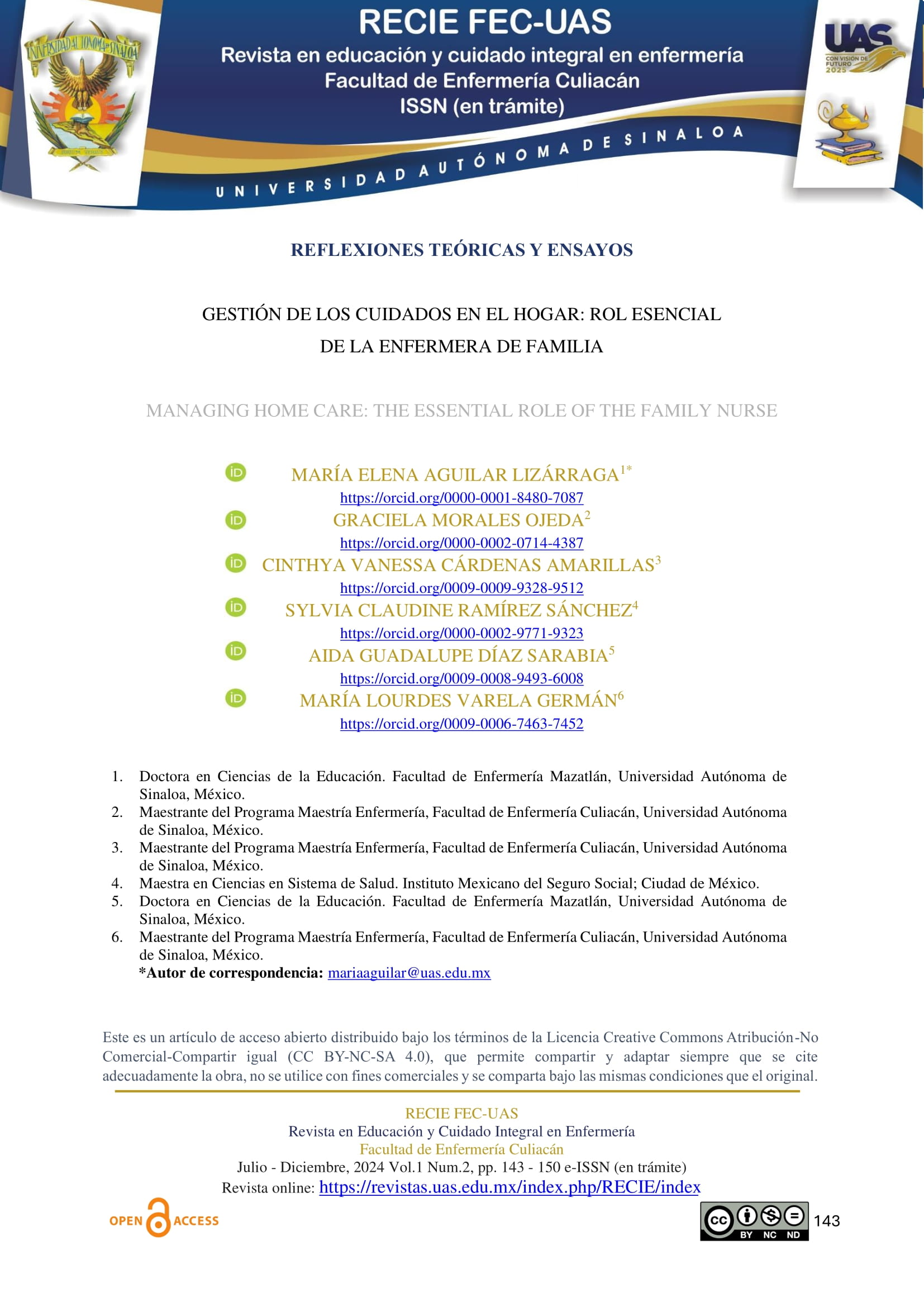The Managing home care: The essential role of the family nurse
Keywords:
Care management, Family nurse, Home care, Chronic diseases, Health equityAbstract
Introduction: Home care management has gained great relevance in contemporary health care, especially in the context of population aging and the increase in chronic diseases. Objective: To highlight the importance of home care management and the essential role played by the family nurse in this process. Development: Home care provides a personalized approach that improves the patient's quality of life and promotes their autonomy. Family nurses are essential to offer continuous and coordinated care, which reduces the risk of complications and hospitalizations. In addition, these professionals contribute to the education of the patient and their family on the management of chronic diseases. Investment in the training of nurses and the creation of interprofessional teams is proposed to improve care. Conclusion: Home care management is an effective and sustainable strategy for the health care of the population. To strengthen this model, it is essential to implement policies that promote equity and access to health services, especially in vulnerable communities.
Downloads
References
Avendaño Zamora, P. K., Pérez Hernández, G., Aguilar Sánchez, H., Gaxiola Flores, M., Tirado Reyes, R. J., Mancera González, O., & Acosta Ríos, M. A. (2023). Educational intervention and family assessment in older adults at risk of falls and cognitive impairment. Revista Sanitaria de Investigación, 4(11). https://doi.org/10.34896/rsi.2023.37.84.002
Castro Romero, M. A. E., Padilla Ordoñez, M. P., Gámez Medina, M. E., Ahumada Cortés, J. G., Tirado Reyes, R. J., Santos Quintero, M. I., & Garay Núñez, J. R. (2023). Educational intervention and family health study in older adults with diabetes mellitus and hypertension. Revista Sanitaria de Investigación, 4(11). https://doi.org/10.34896/rsi.2023.93.69.001
Chang, P.-Y., Wang, H.-P., Chang, T.-H., Yu, J.-M., & Lee, S.-Y. (2018). Stress, stress-related symptoms and social support among Taiwanese primary family caregivers in intensive care units. Intensive & Critical Care Nursing: The Official Journal of the British Association of Critical Care Nurses, 49, 37–43. https://doi.org/10.1016/j.iccn.2018.05.002
Diario Oficial de la Federación (2022). Acuerdo por el que se emite el Programa Estratégico de Salud para el Bienestar. 07 de septiembre de 2022 https://www.dof.gob.mx/nota_detalle.php?codigo=5663700&fecha=07/09/2022
Duque Ortiz, C., y Arias-Valencia, M. M. (2021). Relación enfermera-familia en la Unidad de Cuidados Intensivos. Hacia una comprensión empática. Revista Ciencias de la Salud, 19(1). https://doi.org/10.12804/revistas.urosario.edu.co/revsalud/a.10059
Instituto Nacional de Estadística y Geografía e Informatica (2023). El INEGI presenta los resultados de la Encuesta Nacional de Ingresos y Gastos de los Hogares (ENIGH) 2022. https://www.inegi.org.mx/contenidos/saladeprensa/boletines/2023/ENIGH2022.pdf
McAlister, L. (2021). Nurses’ impact on home healthcare. Encompass Health Connect. https://blog.encompasshealth.com/2021/04/27/nurses-impact-on-home-healthcare/
National Academies of Sciences, Engineering, and Medicine; National Academy of Medicine; Committee on the Future of Nursing 2020–2030, Flaubert, J. L., Le Menestrel, S., Williams, D. R., & Wakefield, M. K. (Eds.). (2021). The Future of Nursing 2020-2030: Charting a Path to Achieve Health Equity. National Academies Press (US). https://pubmed.ncbi.nlm.nih.gov/34524769/
Organización Mundial de la Salud. (2020). Envejecimiento y salud. https://www.who.int/es/news-room/fact-sheets/detail/ageing-and-health
Rojas, V. (2019). Humanización de los cuidados intensivos. Revista médica Clínica Las Condes, 30(2), 120–125. https://doi.org/10.1016/j.rmclc.2019.03.005
Ruiz, J. (2023, octubre 20). Cuidados para pacientes ostomizados: Importancia de la enfermera en el hogar. Multiversidad. https://sinfronteras.edu.mx/licenciatura-enfermeria-escuelas-cuidados-pacientes-ostomizados/
Secretaría de Salud de México (2021). Estrategia nacional de salud. https://www.gob.mx/salud/prensa/183-estrategia-basada-en-atencion-primaria-de-la-salud-pilar-en-mitigacion-de-covid-19-a-nivel-comunitario?idiom=es-MX
Tirado Reyes, R. J., Silva Maytorena, R., Garay Núñez, J. R., Acosta Ríos, M. I., Aguirre Zazueta, A. G., y Ontiveros Herrera, G. (2023). Deterioro cognitivo y riesgo de caídas en adultos mayores en Culiacán, Sinaloa, México. Dilemas Contemporáneos: Educación, Política y Valores. https://doi.org/10.46377/dilemas.v10i3.3632
Tirado-Reyes, R. J., Retamoza, P. L., Muñoz-Valencia, N. X., Acosta-Torres, D. E., y Mendívil-Gastelum, L. V. (2021). Síndrome climatérico y funcionalidad familiar. Revista de Enfermería del Instituto Mexicano del Seguro Social, 29(2), 86-95. http://revistaenfermeria.imss.gob.mx/editorial/index.php/revista_enfermeria/article/view/1186/1155
Yao, N., Mutter, J. B., Berry, J. D., Yamanaka, T., Mohess, D. T., & Cornwell, T. (2021). In Traditional Medicare, Modest Growth In The Home Care Workforce Largely Driven By Nurse Practitioners: Study examines the characteristics of the workforce providing home-based medical care for traditional (fee-for-service) Medicare beneficiaries. Health Affairs, 40(3), 478–486. https://doi.org/10.1377/hlthaff.2020.00671

Downloads
Published
Issue
Section
License

This work is licensed under a Creative Commons Attribution-NoDerivatives 4.0 International License.

